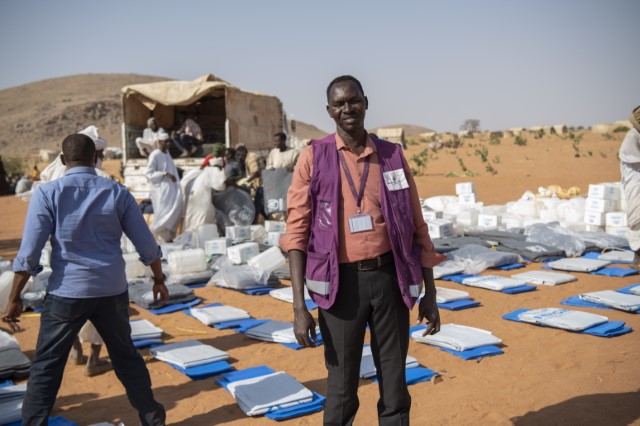
The war in Ukraine has had detrimental knock-on effects on the humanitarian contexts in many countries. Thanks to new funding from the Norwegian Government, NCA can now help meet these needs in Ethiopia, Lebanon, Nigeria, Palestine and Somalia.

The Nansen Programme Proposal, adopted in Parliament on 9th of March 2023, is a NOK 75 billion five-year programme in response to the war in Ukraine. It comprises humanitarian, development, and military aid to Ukraine and neighbouring countries. As an additional part of the Nansen Programme, the Norwegian Government’s 2023 Aid Budget was increased by NOK 5 billion to support vulnerable countries affected by the war in Ukraine.
This was a result of the advocacy efforts from NCA, and other humanitarian organisations, to persuade the Norwegian Government to not leave other countries behind while providing the Ukrainian people with vital support.
Countries that have experienced detrimental consequences to humanitarian and food security situations due to increased food, fuel and other commodity prices, as well as disruptions to their fuel and grain markets, are particularly prioritised for this additional support.
The extra support will fund projects through multilateral organisations, such as WFP, UNICEF, IOM, as well as INGOs such as NCA, and is managed through Norad, the MFA, and certain embassies.
“NCA implements projects in Ukraine and Moldova through funding available from the Nansen Programme. In addition, NCA has received two large additional grants through the NOK 5 billion additional funding for vulnerable countries.”
NCA and partners will implement additional crisis modifier projects through the MFA SPA flexible funds mechanisms to respond to the detrimental knock-on effects of the Ukraine war on the humanitarian contexts in Ethiopia, Lebanon, Nigeria, Palestine and Somalia.
These crisis modifier projects will provide lifesaving WASH, SGBV, ASRH and cash support to IDPs and host communities that are particularly hit by high fuel and food prices and especially prone to resorting to negative coping mechanisms.
The five crisis modifier projects have a total budget of NOK 57.75 million and will be implemented by the end of May 2024.
Food insecurity is the most pressing need due to rising commodity prices and decreased wheat imports from key grain producers Ukraine and Russia.
For example, Lebanon is heavily important-dependent and received 80% of its wheat from Ukraine before the war in Ukraine. Here, the cost of a food basket, the minimum food needs per family per month, increased by 351% between 2021 and 2022.
In Nigeria, which is also dependent on importing essential staple goods, the increases in fuel and input prices contributed to an inflation rate of nearly 22% in January 2023, the highest since 2005.
.png)
Photo: Norwegian Church Aid
In addition to food insecurity, the consequential pressure on other needs, such as WASH and protection, has also increased across many of the countries where NCA operates.
Globally, the increase in support for the humanitarian situation in Ukraine has meant reductions in aid budgets for other countries, yet the urgency of needs persists.
NCA and partners have reported that the situation for people in need is deteriorating. The population is under pressure, both physically (internal displacement in search of better conditions increases, IDP camps are crowded) and psychosocially (deterioration of hope, domestic violence, depression and despair).
Women and children are more vulnerable than before. Women describe a growing taboo linked to talking about experiences of sexual violence, and GBV has become deprioritised in humanitarian responses as food security is more acute.
For WASH, costs related to infrastructure have sky-rocketed in all five countries due to higher input prices and the deterioration of local currencies. The lack of sufficient WASH infrastructure and services negatively affects food security and, if pressured too far, can significantly affect disease outbreaks, household agriculture and health. However, adequate access to water can enable the success of food security initiatives in areas where drought prevails, and sanitation and hygiene services ensure that food is not contaminated.
Through the “Faith in Farmers: Boosting Local Production for Food Security in Africa” grant, NCA and partners will implement quick-impact food security projects in Tanzania, Zambia, Somalia, Ethiopia and Malawi over the next twelve months (01.07.23-30.06.24), with a total budget of NOK 79.6 million.
The primary objective is to enhance the resilience of local food systems and reduce the scale of the five countries' hunger crisis by contributing to increasing local climate-resilient food production, local value creation and income for food producers, and a reduction in malnutrition and under nutrition.
The grant is provided for scaling up already existing Climate Smart Economic Empowerment (CSEE) programmes in the countries, targeting categorised as phases two through five in the IPC food insecurity mapping tool.
In these five countries where NCA implements CSEE programmes with a focus on agricultural production, prices for agricultural inputs and transportation to markets have been severely impacted, and there is a need to boost production in order to ensure food security and reduce hunger among the populations.
For example, in Malawi and Ethiopia, prices for inputs such as fertilizer have sky-rocketed (400% in Malawi) due to the war in Ukraine. In Zambia, there are severe supply constraints of inputs for farmers resulting from the knock-on effect of the Ukraine. In Somalia, the war has led to a disruption of the food supply, and in Tanzania, inflation is causing food insecurity. Activities include agricultural inputs (drip irrigation kits, seeds, fertilizer), inputs to ensure value-addition activities, training in post-harvest management, cash-for-work, and training in nutrition,.
The total number of direct rights-holders reached through this project grant is 180,198. NCA and partners will target a total of 32,256 smallholder farmers to increase productivity and thus increase their income. 24,657 households (HHs) are targeted to reduce malnutrition and undernutrition and ensure their food security in the coming months.